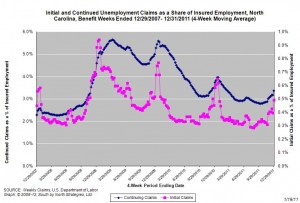19.01.2012
Policy Points
Economic policy reports, blog postings, and media stories of interest:
19.01.2012
Policy Points
For the benefit week ending on December 31, 2011, some 27,963 North Carolinians filed initial claims for state unemployment insurance benefits, and 142,665 individuals applied for state-funded continuing benefits. Compared to the prior week, there were more initial and continuing claims. These figures come from data released by the U.S. Department of Labor.
Averaging new and continuing claims over a four-week period — a process that helps adjust for seasonal fluctuations and better illustrates trends — shows that an average of 18,380 initial claims were filed over the previous four weeks, along with an average of 125,385 continuing claims. Compared to the previous four-week period, the average number of initial claims was higher, as was the average number of continuing claims.
One year ago, the four-week average for initial claims stood at 21,747 and the four-week average of continuing claims equaled 139,061.
In recent weeks covered employment has increased slightly and has returned to the 3.73 million level recorded a year ago. Nevertheless, there are still fewer covered workers than there were in January 2008, which means that payrolls are smaller today than they were almost three years ago.

The graph shows the changes in unemployment insurance claims measured as a share of covered employment in North Carolina since the recession’s start in December 2007.
Both new and continuing claims appear to have peaked for this cycle, and the four-week averages of new and continuing claims have fallen considerably. Yet continuing claims remain at an elevated level, which suggests that unemployed individuals are finding it difficult to find new positions.
19.01.2012
Policy Points
Adam Levitin of Credit Slips argues that “the fundamental rule of American capitalism is ‘profit, but fairly’.”
Bottom line here is that the benefits of increasingly specialized financial intermediation are questionable, and the role of government in financial intermediation and development is often overlooked. Privatized financial intermediation often means privatization of gains and socialization of losses, as we have recently seen. More critically, though, absent vigorous regulation, it easily dissolves into a system of profit über alles, in which rules of fair play (and we can debate just what those should be) are disregarded as inconvenient. For capitalism to work in a democracy, it is necessary that everyone play by the rules of the game.
18.01.2012
Policy Points
Economic policy reports, blog postings, and media stories of interest:
18.01.2012
Policy Points
A recent episode of the WUNC radio program “The State of Things” discussed the problem of poverty and North Carolina.
Click here to listen to the 15-minute segment.


 Email Sign-Up
Email Sign-Up RSS Feed
RSS Feed